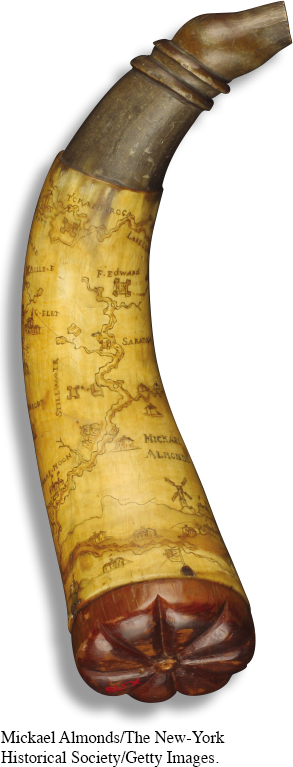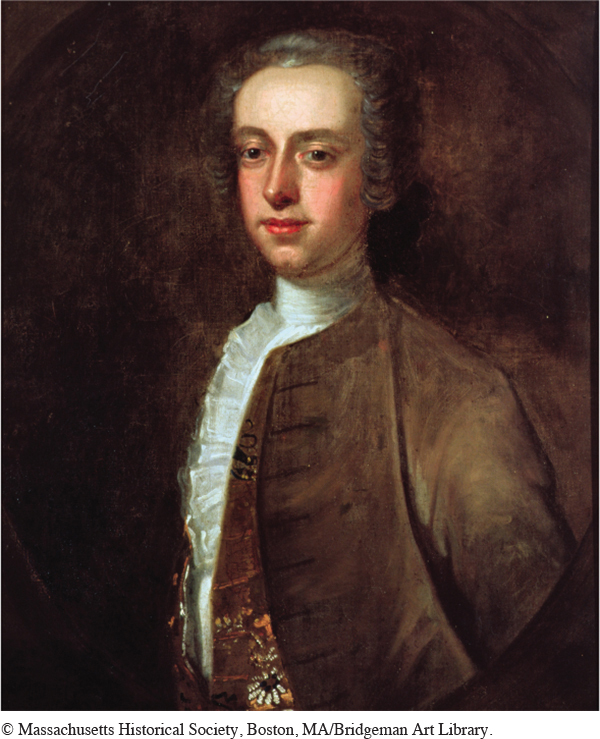The American Promise: Printed Page 135
The American Promise, Value Edition: Printed Page 125
The American Promise: A Concise History: Printed Page 144
Introduction to Chapter 6
The American Promise: Printed Page 135
The American Promise, Value Edition: Printed Page 125
The American Promise: A Concise History: Printed Page 144
Page 1356
The British Empire and the Colonial Crisis
1754–

CONTENT LEARNING OBJECTIVES
After reading and studying this chapter, you should be able to:
Recognize how the American colonies fit into the British empire’s campaigns against other European powers and how the Seven Years’ War laid the groundwork for the imperial crisis of the 1760s in British North America.
Define the Sugar and Stamp Acts, and explain why and how American colonists opposed them.
Explain how the British government responded to colonists’ growing opposition to royal authority.
Identify the events that escalated tensions between British leaders and the colonists.
Explain the Intolerable Acts and the purposes and goals of the First Continental Congress.
Identify the origins of the battles of Lexington and Concord.
IN 1771, THOMAS HUTCHINSON BECAME THE ROYAL GOVERNOR OF THE colony of Massachusetts. Most royal governors were British aristocrats sent over by the king for short tours of duty, but Hutchinson was a fifth-
Hutchinson had the misfortune to be a loyal colonial leader during the two tumultuous decades leading up to the American Revolution. He worked hard to keep the British and colonists aligned in interests, even promoting a plan to unify the colonies with a limited government (the Albany Plan of Union) to deal with Indian policy. His plan of union ultimately failed, however, and a major war—
Not everyone in Boston shared his opinion. Enthusiastic crowds protested a succession of taxation policies enacted after 1763, from the Sugar Act to the Tea Act. But Hutchinson maintained his steadfast loyalty to Britain. His love of order and tradition inclined him to unconditional support of the British empire, and by nature he was a measured and cautious man. “My temper does not incline to enthusiasm,” he once wrote.
The American Promise: Printed Page 135
The American Promise, Value Edition: Printed Page 125
The American Promise: A Concise History: Printed Page 144
Page 136
Privately, he lamented the stupidity of the British acts that provoked trouble, but his rigid sense of duty always prevailed, making him an inspiring villain to the emerging revolutionary movement. The man not inclined to enthusiasm unleashed popular enthusiasm all around him. He never appreciated that irony.
In another irony, Thomas Hutchinson early recognized the difficulties of maintaining full rights and privileges for colonists so far from their supreme government, the king and Parliament in Britain. At a crisis point in 1769, when British troops occupied Boston, he wrote privately to a friend in England, “There must be an abridgement of what are called English liberties. . . . I doubt whether it is possible to project a system of government in which a colony three thousand miles distant from the parent state shall enjoy all the liberty of the parent state.” He could not imagine the colonies without a parent state, existing independently.
Thomas Hutchinson was a loyalist, as were most English-
The opposite of liberty was slavery, a coerced condition of nonfreedom. Political rhetoric about liberty, tyranny, and slavery heated up the emotions of white colonists during the many crises of the 1760s and 1770s. But this rhetoric turned out to be a two-
CHRONOLOGY
| 1754 |
|
| 1755 |
|
| 1757 |
|
| 1760 |
|
| 1763 |
|
| 1764 |
|
| 1765 |
|
| 1766 |
|
| 1767 |
|
| 1768 |
|
| 1768– |
|
| 1770 |
|
| 1772 |
|
| 1773 |
|
| 1774 |
|
| 1775 |
|